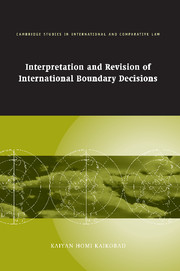Book contents
- Frontmatter
- Contents
- List of maps
- Preface
- Acknowledgments
- Table of cases
- List of abbreviations
- Part I Introduction
- Part II The settlement of territorial and boundary disputes
- Part III Judicial remedies: interpretation
- 3 The interpretation of judgments and awards
- 4 The classification of the notion of interpretation
- 5 Legal issues regarding interpretation
- 6 Principles of interpretation
- Part IV Judicial remedies: revision
- Part V Conclusions
- Select bibliography
- Index
- CAMBRIDGE STUDIES IN INTERNATIONAL AND COMPARATIVE LAW
6 - Principles of interpretation
Published online by Cambridge University Press: 14 September 2009
- Frontmatter
- Contents
- List of maps
- Preface
- Acknowledgments
- Table of cases
- List of abbreviations
- Part I Introduction
- Part II The settlement of territorial and boundary disputes
- Part III Judicial remedies: interpretation
- 3 The interpretation of judgments and awards
- 4 The classification of the notion of interpretation
- 5 Legal issues regarding interpretation
- 6 Principles of interpretation
- Part IV Judicial remedies: revision
- Part V Conclusions
- Select bibliography
- Index
- CAMBRIDGE STUDIES IN INTERNATIONAL AND COMPARATIVE LAW
Summary
Preliminary observations
It will be appropriate now to state some of the basic principles of interpretation. These are the rules tribunals have relied on to guide them in the interpretation of judgments and awards of international tribunals, including their own earlier pronouncements. A few preliminary points are noteworthy in this context. First, the rules relating to the interpretation of treaties constitute a close parallel to the interpretation of the decisions of international tribunals; there is a clear analogy, albeit limited, between these two categories, and it is the case that the analogy is not lost on tribunals, not least because the rules of treaty interpretation serve as a general source of guidance to tribunals when clarifying disputed passages in the text of decisions. There is of course some difference between these two kinds of interpretative processes.
For one thing, while the rules of interpretation are well developed in the corpus of international law, in terms of both customary as well as conventional law, the Vienna Convention on the Law of Treaties being the best example of the latter source of law, the interpretation of decisions is relatively less well developed, at least in the field of law currently under examination. For another, there is the intrinsic nature of the subject matter of interpretation. A treaty, of course, is a product of negotiation and compromise, and it usually represents the lowest common denominator in terms of agreement between the parties.
- Type
- Chapter
- Information
- Interpretation and Revision of International Boundary Decisions , pp. 175 - 228Publisher: Cambridge University PressPrint publication year: 2007



